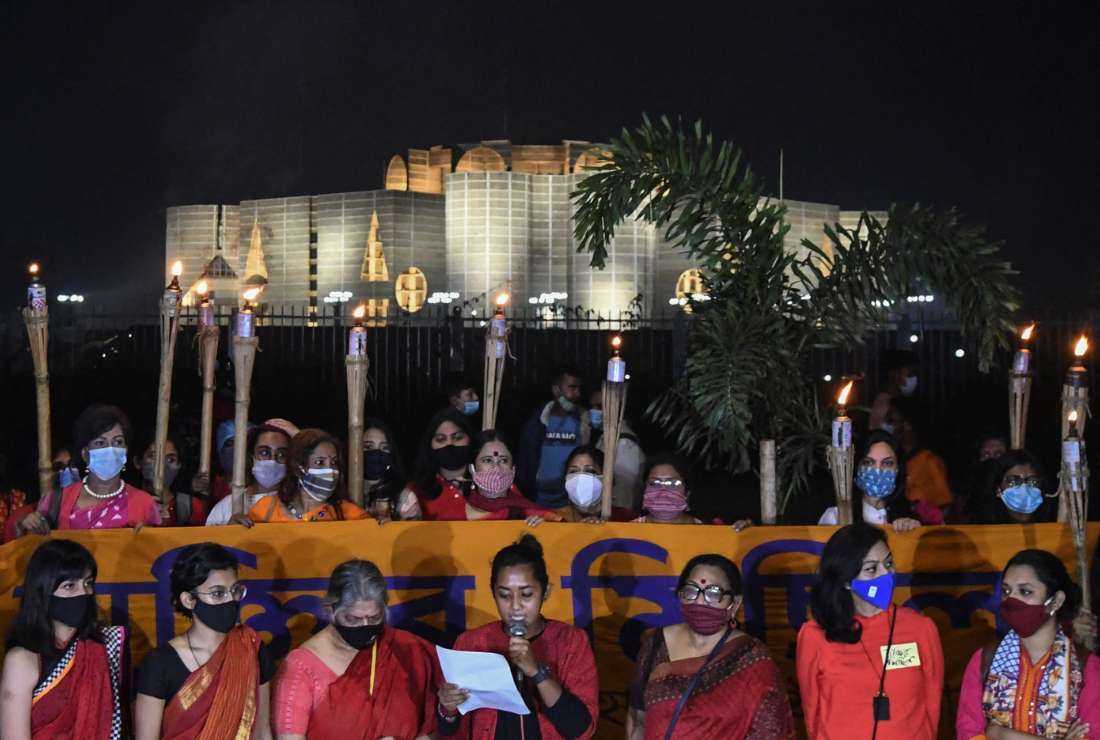
Social activists read a manifesto in front of the Parliament House of Bangladesh during a protest against an alleged rape and torture of a woman, in Dhaka on Nov. 25, 2020. Religious and ethnic minorities are the most vulnerable as a result of eroding democratic institutions and organized violence under political patronage directed against them in the Muslim majority nation. (Photo: AFP)
In the Jan. 7 election, the Awami League (AL) won for a fourth straight term, winning 222 seats in the 350-seat parliament.
It claims it swept the poll by winning 74 percent of seats as elections were held in only 299 constituencies, except for one where an election was postponed due to the death of a candidate. The other 50 seats, reserved for women, are nominated proportionally by elected members.
The main opposition party, the Bangladesh National Party, boycotted the elections after the ruling party rejected its demand to put the country under a caretaker government to help conduct “free and fair” polls. The previous two elections in 2018 and 2014 were also held under similar circumstances.
Dummy candidates of the ruling party contested the poll and gave it a semblance of an election. Parliament is now dominated by millionaires and those accused of crimes such as murder and organized violence.
“The parliament has become a clubhouse of looters and aggressive people,” Farha Tanzim Titil, who teaches economics at state-run Islamic University, told UCA News.
At least 67 percent or 200 out of 299 members are businessmen and 90 percent of them are millionaires, according to a report from Shujan, a platform of citizens’ campaigning for good governance.
The number of MPs accused of crimes has dropped significantly from over 40 percent to 6.69 percent in the latest election because of the government’s long stay in power, the Shujan report said.
Religious and ethnic minorities, the most vulnerable of Bangladesh’s people, are the first to feel the result of eroding democratic institutions as most cases of organized violence under political patronage are directed against them in the Muslim majority nation.
The situation of tribal people, mostly Christians in Govindaganj in south-eastern Bangladesh, is a case in point.
Just over two weeks after the new parliament came into being, they already are facing violence allegedly instigated by Abul Kalam Azad, the MP elected in their constituency.
On Jan. 12, when MPs were being sworn in, tribal Christian-dominated villages experienced a power blackout in which the local electricity supplier was unable to restore a connection to irrigation projects in Govindaganj, supposedly on the orders of the MP.
“Without irrigation, there will be no crops. The Santals will be forced to leave,” said Philemon Baske, a Catholic and local land rights activist in Govindaganj.
Azad is accused of organizing crimes to force tribal people from their homes to take over some 730 hectares (1,800 acres) of land. He is also the main accused in the murder case of Ovidio Mardy, a Catholic and government land officer. Mardy, a Santal, was found dead on a road near his workplace in Govindaganj, on Jan. 11, 2014.
Mardy’s family and local Santals alleged that he was a victim of Azad’s wrath for his defense of tribal land rights and opposition to land grabbing by Azad and his men.
Azad was the MP from 2014-2018 but failed to secure the AL nomination during the 2018 election allegedly due to his involvement in various controversies and crimes. But he succeeded being elected this time.
He is also accused of mounting a violent eviction campaign against Santals in Govindaganj in 2016 that left three Santals dead, scores injured and thousands of families evicted from their homes amid a long-running land dispute.
Ethnic and religious minorities elsewhere in Bangladesh are also facing attacks and intimidation as other known oppressors of minorities secured victory in the Jan. 7 election.
“All the minority attackers are from the same party — the Awami League,” said Rana Dasgupta, secretary of the Bangladesh Hindu Buddhist Christian Unity Council (BHBCUC), the country’s largest religious minority forum.
“The situation has become so critical that victims are refusing to lodge any complaints, silently enduring repression,’ said Sanjeeb Drong, an ethnic Garo Catholic and secretary of the Bangladesh Adivasi Forum, a national forum of ethnic minorities. The BHBCUC have recorded several incidents of minority repression since Jan. 7.
On Jan. 8, Barun Kumar Ghosh, 35, a Hindu, was killed allegedly by AL activists for campaigning against them in the election in the Jhenidah-2 constituency.
Also, on Jan. 8, some AL supporters stole goats worth 500,000 taka (US$4,563) from four Hindu families in Kulipatti, a village in Bogra distrcit, local newspapers reported.
Hindus from another constituency are upset to see the return of AKM Bahauddin Bahar to parliament, who is known for making anti-Hindu remarks.
On Oct. 4, 2023, Bahar allegedly urged Hindus to hold “an alcohol-free Durga Puja” ahead of the largest annual Hindu religious festival. Bahar’s supporters reportedly attacked and injured Hindus who protested against the remark.
Another parliamentarian, Mohammad Shibli Sadeeq, has a history of grabbing tribal-owned land. Before the election, minority leaders made open calls urging voters not to re-elect Sadeeq.
Minority leaders also lamented a decline in political representation in the new parliament. The tally of minority MPs dropped from 18 to 14. The AL allowed 18 candidates from minority groups to stand on its ticket. Four of them lost including Jewel Areng, a Garo Catholic and the only Christian candidate.
AL’s cultural secretary, Ashim Kumar Ukil, a Hindu who lost in the election, said the party is trying to contain “targeted attacks on minorities.”
